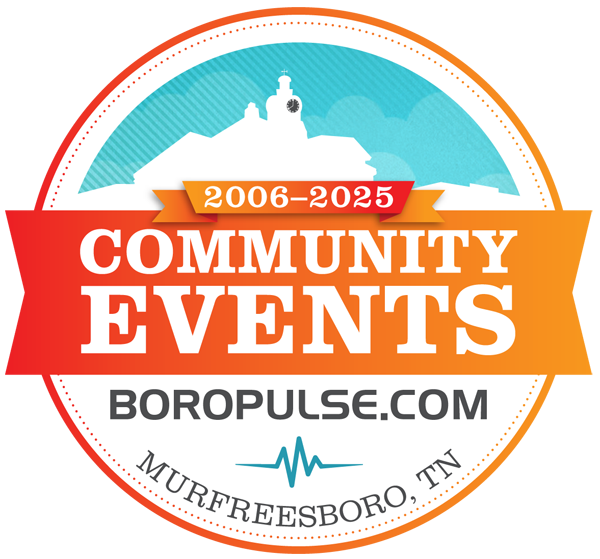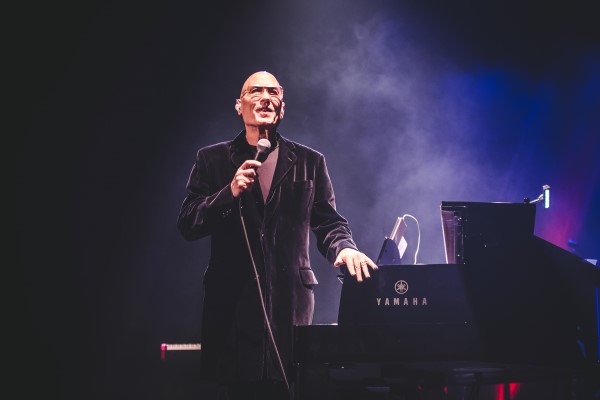
Pianist Mike Garson, former Spider from Mars and longtime Bowie collaborator, currently on tour with A Bowie Celebration. Photos by Steve Rose
When the kids had killed the man, I had to break up the band . . . (“Ziggy Stardust,” 1972)
Ziggy Stardust wasn’t killed by his fans. He was put to death by his creator, David Bowie. Bowie’s breakthrough 1972 album, Ziggy Stardust and the Spiders From Mars, was centered around its titular fictional character, an outrageously garbed and coiffed androgynous rock guitar god destined for destruction. What made Ziggy all the more compelling was the fact that, for a time, Ziggy was Bowie, and Bowie was Ziggy. Between early 1972 and mid-1973, as he embarked on European, Japanese and American tours and recorded the final official Spiders From Mars-backed album, Aladdin Sane, the line separating the creator and the created seemed a thin one to be sure. Perhaps the only certain way for Bowie to escape Ziggy’s grip was to retire the character and dismantle his band, which he announced his intention to do at their final show—unbeknowst to the band members themselves—onstage at London’s Hammersmith Odeon. The untimely demise of the Spiders From Mars was a major loss for ’70s rock, and yet Bowie was quite likely right in thinking he’d painted himself into a too-tight corner inside the Stardust persona. The cocaine he would later admit he’d heavily relied on during his dramatic rise to stardom no doubt played a role, too, in the shockingly sudden shift.
As an artist, he nonetheless had an uncanny instinct about when to make the next move, no matter how sudden or drastic a move it might seem to his fans. This was simply the way David Bowie rolled, according to pianist and longtime Bowie associate Mike Garson, who toured with the Spiders for most of the legendary Ziggy Stardust dates (which included two stops in Nashville between November 1972 and February of ’73) and went on to play and record with Bowie through 1975, rejoining the star later in his career. “It was never personal with musicians he fired, or changed,” Garson says. “He always had something in his mind that he wanted to do to keep himself creative and fresh, honoring how he heard things in his head.” Garson spoke with the Pulse last month from Denver, Colorado, where he and some of his fellow Bowie stage and studio alumni stopped for a scheduled date on an extended jaunt fittingly titled A Bowie Celebration.
Several weeks after David Bowie succumbed to cancer in January 2016, Garson and others who’d played on the final Bowie tour were called to back young New Zealand singer Lorde at the Brits Awards, which presented a multimedia tribute in honor of the fallen superstar. From there, Garson explains, a limited series of shows were staged featuring a core team of Bowie musicians and guest artists ranging from Sting and Lollapalooza founder Perry Farrell to Def Leppard’s Joe Elliott. Ultimately, Bowie’s own alumni decided “they wanted to be the essence of it, finding the best possible singers to represent David’s music,” Garson says. The traveling troupe, anchored by key Bowie personnel Garson on piano, guitarist Earl Slick and bassist Carmine Rojas, will bring longtime Rolling Stones support vocalist Bernard Fowler and Living Colour singer Corey Glover with them when they hit the stage at Nashville’s Polk Theater at TPAC on Wednesday, March 13.
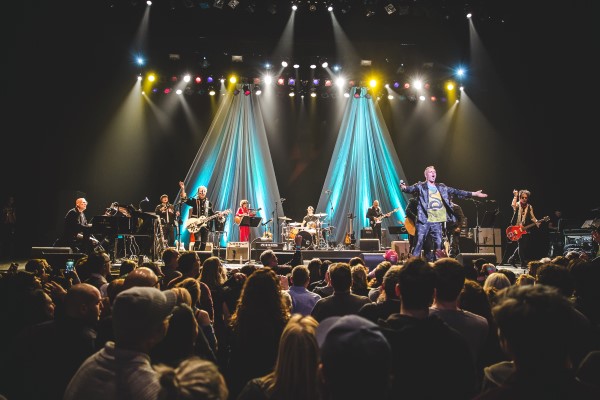
Garson promises a mixture of hits and deep cuts, noting that the band is prepared to play 40-odd Bowie selections—roughly double the number that can be wedged into a performance. This keeps the set list fluid, the shows from becoming too routine and the band from slipping into auto-pilot, a practice that Bowie himself employed at times in order to keep monotony at bay. Bowie’s career-long desire to avoid predictability, in fact, figured prominently in his many-hued body of work, which in its first decade or so alone underwent perhaps a half-dozen stylistic shifts.
https://www.youtube.com/watch?v=5YIXazRv-9I
“I’m just trying to follow David’s spirit [in the shows], because he did that with us,” Garson recalls. “We’d be onstage and he’d call [an unexpected] tune, in the middle of a very big tour. I think that’s what it’s like when you’re an artist and feeling things based on many factors that are bigger than us. I know that his creative process and mine were somewhat similar in that we’d get bored fairly quickly,” Garson offers, noting that he alone survived the dismissal of five different sets of musicians between 1972 and 1974. Garson credits that good fortune to his broad training and diverse tastes, which not only allowed him to follow Bowie’s string of ch-ch-ch-changes but, in some respects, assisted the ever-restless artist in pursuing his musical evolution.
Among the musicians who have exerted the greatest influence on Bowie’s sound and vision, Garson made some significant contributions, beginning with the first Bowie album on which he appears; the title track of 1973’s Aladdin Sane as well as “Time” and “Lady Grinning Soul” feature particularly memorable performances from the pianist, while keyboards are prominent, if more subdued, on the transitional album Diamond Dogs. Garson’s skills may have been most valuable in 1974, as Bowie sought reinvention and a way to sidestep Ziggy’s looming shadow. As Bowie somewhat bewilderingly morphed into a self-described “plastic soul” artist drawing largely from Philadelphia-bred R&B music, substantially revamping the sound and style of much of his existing repertoire for the Philly-recorded 1974 collection David Live, Garson’s dexterous keyboard work largely set the tone.
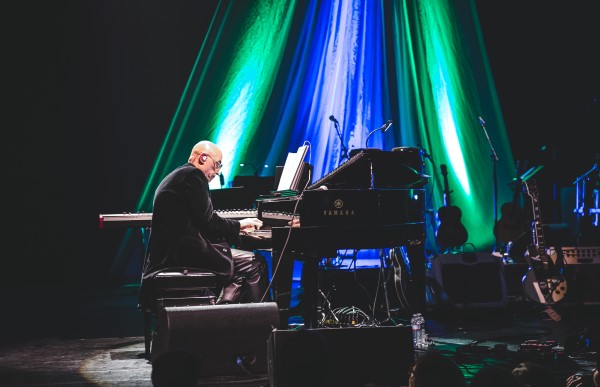
A controversial album among Bowiephiles, David Live finds Garson’s jazz-and-Latin piano finesse and Earl Slick’s roaring guitar combining to create a mutant form of cocktail-hour rock. Garson, who feels that the album’s most recent remastering overemphasizes the piano and now reckons that he may have played more busily than he would later be inclined to do, nonetheless retains a positive feeling about the re-release. Bandmate Earl Slick, Garson reveals, isn’t as fond of the live recording, though many fans would agree that Slick’s beefy, assertive guitar attack was a welcome ingredient for listeners unprepared for Bowie’s shiny, sometimes showbizzy musical makeover.
Slick, a virtual unknown when Bowie enlisted him for his Diamond Dogs album and accompanying tour, stepped from obscurity into the role formerly occupied by one of rock’s preeminent guitar heroes, Mick Ronson. Even now, as one of the premier names in the Bowie Celebration lineup, the accomplished guitarist still defers to certain choices his predecessor made during his lamentably brief period as Bowie’s unforgettable right-hand man. “All the guitar players who I work with talk about him and his greatness,” Garson says. “Earl Slick was just saying yesterday at sound check, he has to play that middle section on ‘Life on Mars’ the way that Mick did it. There are certain things that are so definitive, you know?”
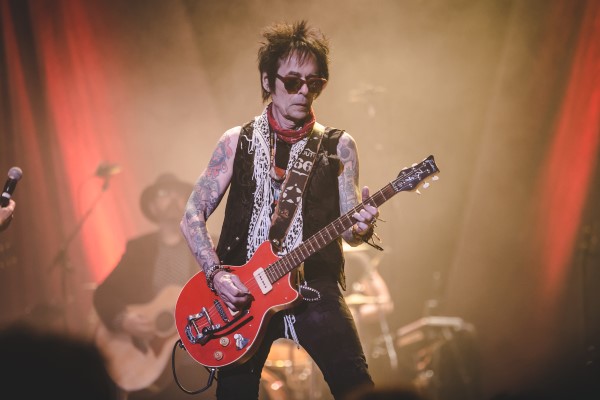
Earl Slick
Garson, who did two Ronson solo albums and many live dates with the guitarist after the Spiders’ imposed split with Bowie, remembers that “the band was great, the music was great, he was great, but he functioned best, I thought, in the role he had with David. But he was a great string writer, a great piano player, the best rock guitarist I’ve ever worked with, and a wonderful guy. And he is an unsung hero.”
Garson says he made it a point to recreate signature string arrangements Ronson wrote, bringing violinists in to record the parts at his home studio for use on the current tour. The epic “Life on Mars?” is among the numbers that are enhanced by string tracks, recreating the original arrangement and providing a dramatic effect never employed onstage during Bowie’s lifetime. It’s a way for Garson to pay tribute to Ronson, who died of liver cancer in 1993. “I have that much respect for his string writing; it was so simple but so perfect.” Garson says that the show’s primary homage to Ronson is “just in the music, when those solos come. He’ll be in it forever because he immortalized those guitar parts.”
Footage from the Ziggy Stardust tours (which can be seen in the recently released Mick Ronson documentary, Beside Bowie) shows just how magnificently the guitarist complemented Bowie, whose sexually ambiguous Ziggy character was bolstered by Ronson’s confident masculinity even while adorned with the unmanly stage makeup he wore as a Spider From Mars. It’s more than a little ironic that Ronson’s attractively easygoing, earthy personality limited his success as a solo artist while his former microphone mate found fame from behind the often alienated alter-egos he adopted for his performances in the ’70s and perhaps beyond.
Bowie’s heavy theatrical bent and introverted nature, Garson agrees, led him to create artistic devices that he utilized to safely conceal himself. “David told me this: that he didn’t see himself as a performer,” Garson says. “He was [initially] nervous as a performer and he didn’t know how to deal with it, so I think he created the Ziggy character to be able to hide behind it. But obviously he was still driving the car . . . he masterminded it, you know?”
Garson, who again recorded and toured with the star during his latter-day renaissance and played on his final U.S. shows, reports that Bowie—who had long since kicked his cocaine habit—ended his career performing without the aid of stage personas. “Now, he definitely told me that when he was doing those last few years of touring in the late ’90s and early 2000s, all of those shows were just David singing songs. And they were great. So he had broken through, and it made him very happy.”
The David Bowie who, in his final years, became comfortable as an onstage singer of songs, left behind a masterful, if sometimes mystifying, collection of them. Without its namesake’s immense charisma and near-otherworldly voice, A Bowie Celebration essentially functions as a showcase for Bowie the songwriter, offering a small but potent overview of his sprawling catalog. “What we have are great songs, and it’s my job to make them sound great,” Garson says. Crediting his fellow band members, he adds, “It feels authentic, it has integrity . . . it sounds like what I remember it sounding like with David.”
Tickets for A Bowie Celebration can be purchased at tpac.org or by calling 615-782-4040.





